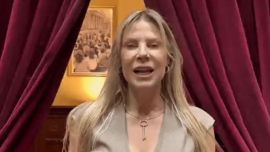Quick to smile and described as affable, Paraguay's new President Santiago Peña, 44, is the fresh face of an old institution – the conservative Colorado Party that has ruled the nation for nearly eight decades.
An economist and former finance minister, Peña managed to keep the party's hegemony intact despite deep divisions over corruption claims against some of its top leaders, including his own political mentor.
This was the 44-year-old's first stab at the presidency, and he had been lagging in opinion polls to centre-left rival Efraín Alegre.
The closest he had ever come to the top job until now was in 2017, when he lost the party primary to the man he will now replace after a constitutionally limited single term: Mario Abdo Benítez.
Tall and athletic, Peña is widely described as a technocrat with a brilliant academic career, but little political experience.
The former IMF economist and Central Bank board member entered politics under former president Horacio Cartes, who is under US sanctions for alleged corruption.
Peña served as finance minister under Cartes, who is the leader of the Colorado Party.
His detractors describe Peña as Cartes' secretary. Alegre went even further, alluding to Peña as the "servant" of Cartes and a party the centre-leftist had sought to paint as a corrupt institution.
But Peña is nonchalant about the criticism. "He is very serene, his peace of mind is impressive," a collaborator told AFP.
'A difficult time'
In the living room of his elegant home in Asunción are photographs of Peña with his wife Leticia Ocampos, whom he married after she became pregnant when they were teenagers.
That son, today 26, was later joined by a sister who is 17 – as old as Peña was when he became a father for the first time.
"It was a difficult time in my life," Peña once told an interviewer about early parenthood. "But it led me to build on very solid principles of commitment, of responsibility, of honesty, of integrity, of knowing that there are people who depend on you. And without realising it, when I was 17, I began to develop a vocation of service."
He said both families helped the young couple and encouraged him to continue studying, which he did at Columbia University in New York.
Peña is a defender of what he describes as traditional family values: against abortion and gay marriage. For him, a family is comprised of "mother, father and children."
'Back to Jerusalem'
Unlike Alegre, Peña has said he will preserve diplomatic relations with Taiwan despite demands in the agricultural and livestock industries to open the export market to China.
However, he told AFP he would move Paraguay's Embassy in Israel from Tel Aviv to Jerusalem.
Paraguay had previously moved its Embassy in 2018, under Cartes, but reversed its decision within months, provoking anger from Israel which closed its own mission in Asunción in retaliation.
"Yes, I would go back to Jerusalem," Peña told AFP before Sunday's vote.
Moving an embassy to Jerusalem is highly contentious. Israel claims all of Jerusalem as its capital while Palestinians view east Jerusalem as the capital of their future state.
Peña has vowed to create 500,000 jobs, without saying how he will achieve this.
He had previously come under fire for praising the "stability" he said dictator Alfredo Stroessner (1954-89) had brought to the country, though "unfortunately, many freedoms and human rights were curtailed." Up to 3,000 people were killed or disappeared under the Stroessner regime.
related news
by Nina Negrón & Hugo Olazar, AFP























Comments